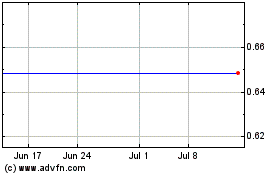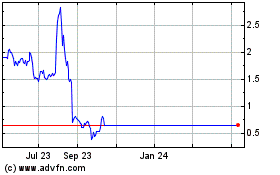By Anne Steele, Sharon Terlep and Brent Kendall
Walgreens Boots Alliance Inc. and Rite Aid Corp. nixed their
$9.4 billion merger agreement, the latest in a series of
high-profile deals to be derailed by antitrust enforcers.
Instead, Walgreens said Thursday it would seek to buy half of
Rite Aid's stores for $5.18 billion in cash. Executives said they
had crafted the new smaller deal to address regulatory issues, but
antitrust experts said there could still be competition
concerns.
During a review that stretched 18 months, Federal Trade
Commission staff didn't back away from concerns that the original
transaction would have harmed competition, according to people
familiar with the matter.
Among the concerns was that the resulting drugstore giant --
which would have challenged CVS Health Corp. -- would have been
able to bully pharmacy-benefit managers steering corporate and
government drug plans.
Under the new deal, Walgreens will buy about 2,200 of Rite Aid's
4,500 stores. Previously, Rite Aid planned to sell about 3,600
stores to Walgreens and up to 1,200 to regional chain Fred's
Inc.
On a conference call Thursday, Walgreens Chief Executive Stefano
Pessina said the smaller transaction addresses 'all substantive'
FTC concerns. The company will be adding stores in regions where it
currently lacks a large presence, including the Northeast and
MidAtlantic. Asked whether that could be a concern for the FTC,
Walgreens General Counsel Marco Pagni said, "you should assume that
we have taken account of specific feedback in formulating the
plan."
The transaction would still leave two national drugstore chains
that dwarf a far smaller No. 3 player. The firms, however, also
compete with pharmacies at grocery chains and discounters like
Wal-Mart Stores Inc.
Seth Bloom, an antitrust lawyer in Washington, said the new deal
still raises questions that would require FTC scrutiny, including
on the issue of Walgreens' growing national muscle.
"Just because it's half the number of stores as the previous
deal doesn't necessarily settle it," Mr. Bloom said. "It could make
the review easier, but it's not a slam dunk yet."
Tad Lipsky, the acting head of the FTC's bureau of competition,
said the FTC would review any new transaction proposed by the
parties. Mr. Lipsky said commission staff had "thoroughly
investigated" the original deal and "evaluated a number of
divestiture proposals put forward by the parties." His statement
declined to offer further details of the FTC review.
Mr. Lipsky said commission staff "thoroughly investigated the
potential impact that the proposed Walgreens/Rite Aid merger may
have had on competition and evaluated a number of divestiture
proposals put forward by the parties." His statement declined to
offer further details of the FTC review.
Walgreens said it expects $400 million in cost savings from the
new deal within three to four years of closing. Walgreens will pay
Rite Aid a $325 million termination fee.
Shares of Rite Aid tumbled 25% on Thursday afternoon while
shares of Walgreens added 1.3% to $79.04. Shares of Fred's fell
19%.
The five-member FTC is currently short-handed, with only two
commissioners, one Republican and one Democrat. But that hasn't
stopped the commission from taking action in some cases, including
earlier this month when it sued to block the proposed merger of
fantasy sports companies DraftKings Inc. and FanDuel Inc.
Walgreens-Rite Aid is the latest in a string of high-profile
deals to fall apart at the hands of regulators. Earlier this year,
two pairs of health insurers -- Aetna Inc. and Humana Inc. and
Anthem Inc. and Cigna Corp. -- said they would terminate their
mergers, worth a combined $82 billion, after courts sided with
regulators and found they violated antitrust law.
Last year, a tie-up of Office Depot Inc. and Staples Inc. was
blocked after a federal judge sided with the FTC that it could lead
to higher prices. On Wednesday, Staples agreed to sell itself to a
private-equity firm for $6.9 billion.
Both Rite Aid and Walgreens -- which has about 8,200 stores in
the U.S. -- have a major presence in California, New York and
Massachusetts, while in other states including Florida, Texas and
Illinois, there isn't any overlap. CVS has about 9,700 stores.
"This still poses really serious antitrust issues," said David
Balto, an antitrust lawyer in Washington who represents parties
that objected to the merger. "It is crystal clear that the FTC has
decided it's essential to have three players and, by acquiring so
many Rite Aid stores, it devastates the future of Rite Aid."
Rite Aid's business has been slumping in recent quarters,
falling further behind Walgreens and CVS. On Thursday, the company
reported that revenue declined 5% to $7.8 billion in the quarter
ended June 3 and it posted a loss of $75 million.
Rite Aid CEO John Standley said the remaining stores are more
profitable, and the smaller size will leave the company less
exposed to reductions in drug reimbursement rates. The company
plans to use deal proceeds to pay down debt and the resulting lower
interest costs will help free up cash to upgrade existing stores,
he said.
Asked on a call Thursday whether the he expects the FTC to
approve the new deal, Mr. Standley said: "There's a chance that it
won't go, that's the reality of the process. We believe it make
sense, we just have to wait until it plays out."
Write to Anne Steele at Anne.Steele@wsj.com, Sharon Terlep at
sharon.terlep@wsj.com and Brent Kendall at
brent.kendall@wsj.com
(END) Dow Jones Newswires
June 29, 2017 12:35 ET (16:35 GMT)
Copyright (c) 2017 Dow Jones & Company, Inc.
Rite Aid (NYSE:RAD)
Historical Stock Chart
From Mar 2024 to Apr 2024

Rite Aid (NYSE:RAD)
Historical Stock Chart
From Apr 2023 to Apr 2024
